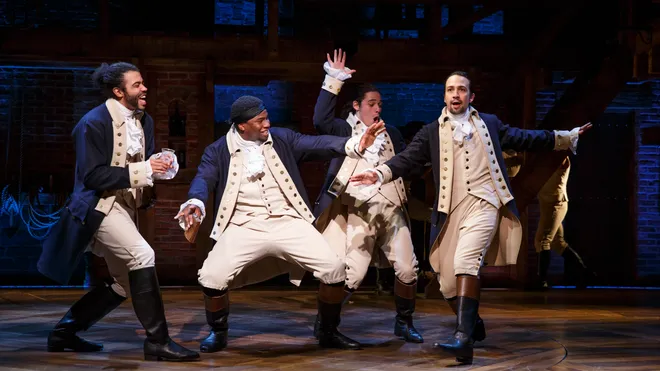The producers behind the global sensation Hamilton have taken a bold and unprecedented stand, canceling the show’s planned 2026 engagement at the Kennedy Center in Washington, D.C. The decision comes in direct response to sweeping changes made at the prestigious cultural institution following a takeover by the Trump administration, which ousted key leadership and scrapped several performances deemed politically sensitive.
In a strongly worded statement, lead producer Jeffrey Seller underscored the show’s refusal to participate in what he described as the politicization of one of the country’s most revered cultural landmarks. The cancellation marks a significant cultural and political flashpoint, as Broadway’s most celebrated musical withdraws from a venue long synonymous with artistic excellence and nonpartisan celebration of the arts.
The decision not only signals Seller’s condemnation of the Kennedy Center’s abrupt shift in leadership but also serves as a broader warning about the dangers of political interference in America’s artistic institutions. Seller’s remarks, coupled with the removal of other inclusive programming at the Center, have set off a firestorm within the theater community.
Hamilton’s Legacy at the Kennedy Center Comes to a Halt
Since its groundbreaking debut, Hamilton has enjoyed an extraordinary relationship with the Kennedy Center. The production’s fusion of American history and modern storytelling resonated powerfully in the heart of the nation’s capital, drawing record crowds and amplifying the Center’s reputation as a beacon for diverse artistic voices. In 2018, Hamilton performed to sold-out audiences during Trump’s first term, demonstrating that even in politically fraught times, the arts could serve as a unifying force.
However, according to Seller, this latest engagement would have taken place under dramatically different circumstances. The removal of longtime Kennedy Center President Deborah Rutter, Chairman of the Board David Rubenstein, and several board members—coupled with the sudden cancellation of artistically and socially progressive programming—shattered the trust that once defined the relationship between Hamilton and the Center. What was once a symbol of cultural inclusion, Seller argued, has been transformed into a tool for exclusionary politics.
With Hamilton’s foundational values rooted in freedom, democracy, and challenging the status quo, the decision to cancel was not made lightly. Seller made clear that the production could not, in good conscience, lend its name and legacy to an institution now governed by a politicized agenda that runs counter to the very spirit of the show.
The Threat to Artistic Freedom at the Kennedy Cente
The ousting of the Kennedy Center’s leadership and the abrupt cancellation of events like the Gay Men’s Chorus performance and the Finn tour sent shockwaves through the artistic community. These cancellations, framed by the new leadership as financial decisions, were widely interpreted as thinly veiled cultural censorship targeting LGBTQ+ content and inclusive programming.
This chilling turn of events, Seller noted, strikes at the heart of what the Kennedy Center was meant to represent. Established to celebrate the nation’s cultural diversity and foster creative expression, the Center has instead become a casualty of ideological warfare. For Hamilton, a production that champions the immigrant story and embraces America’s multicultural identity, participation under such circumstances became untenable.
Seller’s statement underscored that Hamilton’s withdrawal is not an act of partisan defiance against Trump himself, but rather a necessary response to the erosion of artistic neutrality at the Kennedy Center. When an institution meant to foster creativity instead becomes a weapon for exclusion, the artistic community has a responsibility to take a stand, Seller argued.
A Business and Ethical Decision
While Seller framed the decision primarily as a matter of artistic and ethical integrity, he also made clear that it was a pragmatic business decision. The unpredictability of the new Kennedy Center leadership poses serious financial risks for large-scale productions like Hamilton, which employs hundreds of artists, technicians, and creative professionals. With contracts and agreements now subject to potential revision or cancellation at the whims of partisan leaders, the financial stability of the production was placed in jeopardy.
The recent cancellations at the Kennedy Center set a dangerous precedent, signaling that even legally binding contracts could be discarded if they no longer fit the new leadership’s political vision. For Hamilton, whose global brand and artistic reputation depend on both creative freedom and contractual reliability, such instability was untenable. Seller warned that the broader industry should take note—what happens at the Kennedy Center could have ripple effects across the performing arts sector.
Seller’s remarks reflect a growing awareness within the theater community that financial health and creative independence are inextricably linked. When politics intervenes, the very foundation on which major productions are built begins to crumble. By withdrawing from the Kennedy Center, Hamilton is not only protecting itself but sending a powerful message about the need to preserve both artistic and contractual integrity.
Protecting the Soul of the Arts
The cancellation of Hamilton’s Kennedy Center engagement is far more than a scheduling change—it is a clarion call to artists, institutions, and audiences across the country. In an era where cultural spaces are increasingly being drawn into ideological battles, Hamilton’s withdrawal is a forceful assertion that the arts must remain a sanctuary for open expression, not a battlefield for partisan agendas.
Seller’s decision highlights the vulnerability of even the most prestigious institutions when confronted with political interference. By prioritizing artistic integrity over short-term financial gain, Hamilton reaffirms its commitment to the values it celebrates onstage—freedom, inclusion, and the pursuit of truth.
As the cultural landscape continues to shift, Hamilton’s stance will likely serve as both a warning and an inspiration. For artists and audiences alike, the message is clear: America’s cultural treasures belong to everyone, and safeguarding their independence is essential to preserving the soul of the nation.
